If you're seeking natural allergy relief, DIY herbal teas can be a soothing solution. Key ingredients like stinging nettle, peppermint, and chamomile offer antihistamine and anti-inflammatory properties to ease symptoms. Nettle acts as a natural antihistamine, while peppermint clears nasal passages and chamomile reduces inflammation. To make your tea, steep 1-2 teaspoons of dried herbs in hot water for 5-10 minutes. Drink 2-3 cups daily during allergy season for best results. Remember to store your herbal blends properly and be aware of potential side effects. By understanding the power of these herbs, you'll access nature's remedy for seasonal discomfort.
Understanding Seasonal Allergies
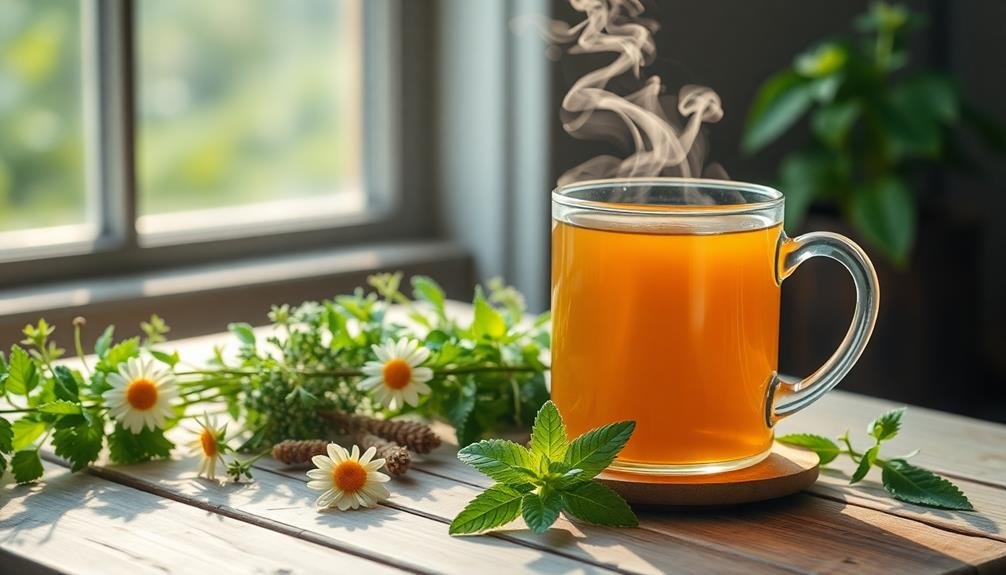
Seasonal allergies are a common foe for millions of people worldwide. These allergies, also known as hay fever or allergic rhinitis, occur when your immune system overreacts to airborne substances like pollen, mold spores, or dust mites. Unlike food allergies or insect stings, seasonal allergies typically follow a predictable pattern, flaring up during specific times of the year.
You'll likely experience symptoms such as sneezing, runny nose, itchy eyes, and congestion when exposed to allergens. The severity can vary from mild discomfort to debilitating reactions that interfere with daily life.
It's essential to recognize that different regions have distinct allergy seasons based on local flora and climate.
To manage your seasonal allergies effectively, you need to identify your specific triggers. Common culprits include tree pollen in spring, grass pollen in summer, and ragweed in fall.
Keeping track of when your symptoms occur and correlating them with local pollen forecasts can help you pinpoint your allergens. Once you've identified your triggers, you can take proactive steps to minimize exposure and seek appropriate treatment, whether through over-the-counter medications, prescription drugs, or natural remedies like herbal teas.
Benefits of Herbal Tea
Herbal teas offer a natural approach to managing your allergy symptoms.
You'll find that many herbs can boost your immune system, helping your body fight off allergens more effectively.
These teas often reduce inflammation and possess natural antihistamine properties, which can alleviate common allergy discomforts like sneezing and congestion.
Boosts Immune System
A robust immune system is your body's first line of defense against seasonal allergies. Herbal teas can greatly boost your immune function, helping you combat allergens more effectively.
By incorporating immune-boosting herbs into your daily tea routine, you'll strengthen your body's natural defenses and potentially reduce allergy symptoms.
Several herbs are known for their immune-enhancing properties:
- Echinacea: This powerful herb stimulates the production of white blood cells, enhancing your body's ability to fight off allergens and infections.
- Elderberry: Rich in antioxidants and vitamin C, elderberry supports overall immune health and may reduce inflammation associated with allergies.
- Astragalus: A staple in traditional Chinese medicine, astragalus root helps activate immune cells and may improve your body's resistance to allergens.
- Ginger: With its anti-inflammatory and antioxidant properties, ginger can help modulate immune responses and potentially alleviate allergy symptoms.
Reduces Inflammation
Inflammation plays an essential role in allergy symptoms, causing discomfort and exacerbating respiratory issues. Herbal tea can be a powerful ally in reducing this inflammation naturally. Many herbs contain compounds that inhibit inflammatory responses in your body, providing relief from allergy symptoms.
When you sip on anti-inflammatory herbal teas, you're introducing natural plant compounds that can help calm your immune system's overreaction. These herbs work by blocking inflammatory pathways and reducing the production of pro-inflammatory molecules in your body.
| Herb | Anti-inflammatory Properties | Common Uses |
|---|---|---|
| Ginger | Contains gingerols and shogaols | Respiratory relief |
| Turmeric | Rich in curcumin | Joint pain, skin issues |
| Chamomile | Contains apigenin | Sinus congestion, stress |
Natural Antihistamine Properties
Among the many benefits of herbal tea for allergy relief, its natural antihistamine properties stand out as particularly effective. Certain herbs contain compounds that mimic the action of synthetic antihistamines, helping to reduce allergy symptoms without the side effects often associated with over-the-counter medications.
When you brew herbal tea with antihistamine properties, you're tapping into nature's pharmacy. These teas can help alleviate common allergy symptoms like:
- Sneezing and runny nose
- Itchy, watery eyes
- Congestion and sinus pressure
- Throat irritation
Some of the most potent herbs for natural antihistamine effects include nettle, butterbur, and chamomile. Nettle, in particular, has been shown to block histamine receptors and reduce inflammatory responses.
Butterbur can be as effective as some commercial antihistamines in reducing allergy symptoms. Chamomile, while best known for its calming properties, also contains compounds that can help reduce inflammation and allergic reactions.
Essential Ingredients for Allergy Relief
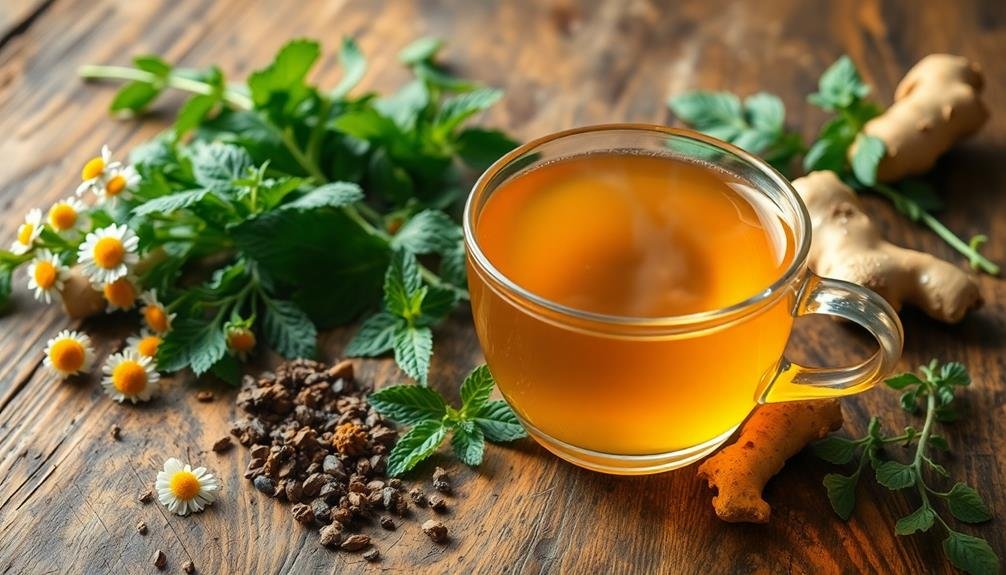
Several key ingredients stand out when crafting an effective herbal tea for allergy relief. You'll want to focus on herbs with natural antihistamine and anti-inflammatory properties. Stinging nettle is a powerhouse, helping to reduce histamine production and relieve nasal congestion. Peppermint can soothe respiratory issues and open up airways, while chamomile offers calming effects that may help reduce allergy-related stress.
Don't overlook the potent benefits of ginger and turmeric. These spices pack a punch with their anti-inflammatory properties, potentially easing allergy symptoms. Elderberry is another excellent addition, known for its immune-boosting qualities that can help your body fight off allergens more effectively.
Here's a quick reference guide for your DIY allergy relief tea:
| Ingredient | Benefits | Recommended Amount |
|---|---|---|
| Nettle | Antihistamine, decongestant | 1-2 teaspoons |
| Peppermint | Respiratory relief | 1 teaspoon |
| Ginger | Anti-inflammatory | 1/2 teaspoon |
Remember to experiment with different combinations to find what works best for you. You can adjust the quantities based on your personal preferences and severity of symptoms.
Choosing the Right Herbs
When choosing herbs for your allergy relief tea, you'll want to focus on two main categories: antihistamine herbs and decongestant plant options.
Antihistamine herbs, such as stinging nettle and chamomile, can help reduce your body's allergic responses.
For congestion relief, consider herbs like peppermint and eucalyptus, which can help clear your airways and ease breathing difficulties.
Antihistamine Herbs
Packed with natural antihistamine properties, certain herbs can provide effective relief from allergy symptoms. These herbs work by blocking histamine production or reducing inflammation in your body, helping to alleviate common allergy issues like sneezing, itching, and congestion.
When creating your DIY herbal tea for allergy relief, consider incorporating these powerful antihistamine herbs:
- Stinging nettle: This herb contains natural antihistamines and anti-inflammatory compounds that can reduce allergy symptoms, particularly those related to hay fever.
- Butterbur: Studies have shown butterbur to be as effective as some over-the-counter antihistamines in treating allergic rhinitis, without causing drowsiness.
- Peppermint: Its menthol content helps to clear nasal passages and ease breathing difficulties associated with allergies.
- Ginger: Known for its anti-inflammatory properties, ginger can help reduce swelling in nasal passages and alleviate congestion.
Decongestant Plant Options
The power of nature extends to decongestant properties found in various plants. When crafting your DIY herbal tea for allergy relief, consider incorporating these effective decongestant options:
- Peppermint: Its menthol content helps clear nasal passages and reduces congestion.
- Eucalyptus: Known for its ability to open airways and ease breathing difficulties.
- Thyme: Contains compounds that loosen mucus and relieve chest congestion.
- Ginger: Offers anti-inflammatory properties that can help reduce swelling in nasal passages.
- Rosemary: Acts as a natural expectorant, helping to clear mucus from the respiratory system.
When selecting these herbs, opt for organic varieties to guarantee you're getting the purest form without pesticides or additives. You can use them fresh or dried, depending on availability and preference.
Steep these herbs individually or combine them for a more potent decongestant effect. Start with 1-2 teaspoons of dried herbs or 2-3 teaspoons of fresh herbs per cup of hot water. Steep for 5-10 minutes, strain, and enjoy.
Remember to consult with a healthcare professional before using these herbs, especially if you're pregnant, nursing, or taking medications.
Nettle Leaf: Nature's Antihistamine
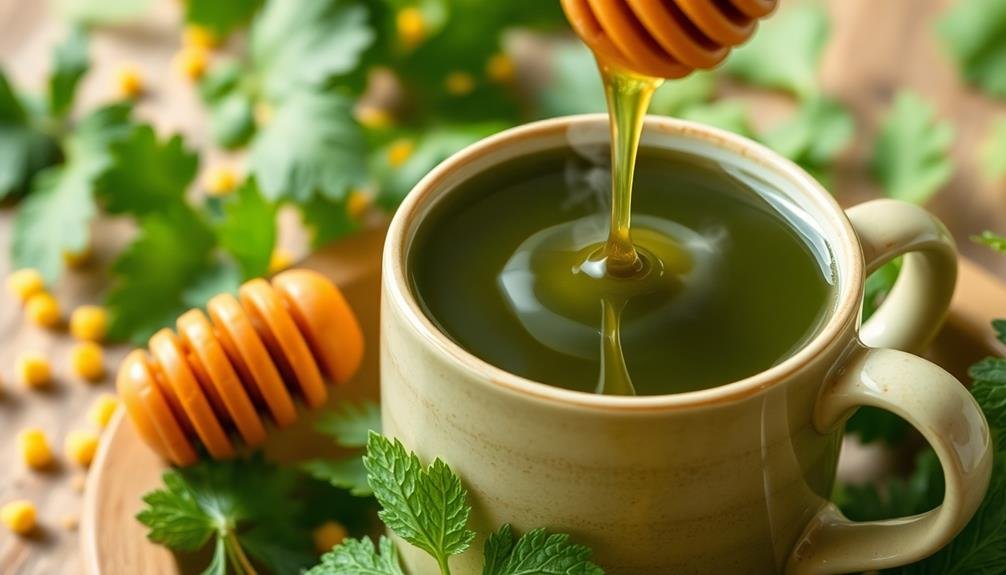
Stinging nettle leaf, often overlooked due to its prickly nature, is a powerful natural antihistamine. When brewed into a tea, it can effectively combat allergy symptoms without the drowsiness associated with many over-the-counter medications. Nettle leaf works by blocking histamine receptors and reducing inflammation in your body.
To make nettle leaf tea for allergy relief, follow these steps:
- Gather fresh nettle leaves (wear gloves!) or purchase dried nettle leaves from a reputable source.
- Steep 1-2 teaspoons of dried nettle leaves (or 1-2 tablespoons of fresh leaves) in hot water for 5-10 minutes.
- Strain the leaves and add honey or lemon to taste.
- Drink 2-3 cups daily during allergy season for best results.
You'll find that nettle leaf tea not only helps with allergies but also provides additional health benefits. It's rich in vitamins and minerals, supports urinary tract health, and may even help reduce joint pain.
If you're pregnant or taking blood thinners, consult your doctor before consuming nettle leaf tea, as it can interact with certain medications.
Peppermint for Sinus Relief
Breathe easier with peppermint, a powerful ally in your fight against sinus congestion. This invigorating herb contains menthol, a natural decongestant that can help clear your nasal passages and reduce inflammation.
When you're struggling with sinus pressure and stuffiness, peppermint tea can provide quick relief. To make peppermint tea, steep 1-2 teaspoons of dried peppermint leaves in hot water for 5-10 minutes. You can also add fresh peppermint leaves to your tea for an extra burst of flavor and potency.
As you sip the tea, inhale the steam to maximize its decongestant effects. The menthol vapors will help open up your airways and ease breathing difficulties.
Peppermint's benefits extend beyond sinus relief. It's known to soothe headaches, reduce nausea, and improve digestion. For an extra boost, combine peppermint with other allergy-fighting herbs like nettle or chamomile.
You can even create an herbal steam by adding a few drops of peppermint essential oil to a bowl of hot water. Drape a towel over your head and inhale the steam for 5-10 minutes to experience immediate sinus relief.
Chamomile's Calming Properties

Soothing and gentle, chamomile is a well-known herb for its calming properties. When it comes to allergy relief, this versatile flower can be a game-changer. Chamomile's anti-inflammatory and antihistamine effects make it an excellent choice for easing allergy symptoms naturally.
To harness chamomile's benefits for allergy relief, you can easily prepare a comforting tea. Here's how it can help you:
- Reduces inflammation in your nasal passages and sinuses
- Eases tension headaches often associated with allergies
- Promotes relaxation, helping you sleep better despite allergy discomfort
- Boosts your immune system to fight off allergens more effectively
To make chamomile tea, steep 1-2 teaspoons of dried chamomile flowers in hot water for 5-10 minutes. For maximum benefit, drink 2-3 cups daily during allergy season. You can also add a touch of honey for extra soothing properties and improved taste.
While chamomile is generally safe, it's crucial to recognize that some people may be allergic to it, especially if they're sensitive to plants in the daisy family.
If you're unsure, consult your healthcare provider before incorporating chamomile into your allergy relief routine.
Ginger's Anti-Inflammatory Effects
Ginger's active compounds, including gingerols and shogaols, pack a powerful anti-inflammatory punch for allergy sufferers.
You'll find that these compounds can help reduce your body's histamine response, potentially easing sneezing, itching, and congestion.
Additionally, ginger's soothing effects on your respiratory system may help alleviate allergy-related breathing difficulties.
Ginger's Active Compounds
The pungent roots of ginger pack a powerful punch against inflammation. This potent effect comes from ginger's active compounds, which work together to combat allergy symptoms. You'll find a variety of bioactive substances in ginger, each contributing to its medicinal properties.
The main active compounds in ginger include:
- Gingerols: These are the primary anti-inflammatory agents in fresh ginger, responsible for its characteristic sharp taste.
- Shogaols: Formed when ginger is dried or cooked, these compounds are even more potent than gingerols.
- Paradols: Similar to shogaols, these compounds contribute to ginger's warming effect and anti-inflammatory properties.
- Zingerone: This compound gives ginger its sweet-spicy aroma and has antioxidant effects.
When you consume ginger, these compounds interact with your body's systems to reduce inflammation and alleviate allergy symptoms. They inhibit the production of pro-inflammatory molecules and help modulate your immune response.
Reduces Histamine Response
One of ginger's most remarkable effects is its ability to reduce histamine response in the body. When you consume ginger, its active compounds work to suppress the release of histamine, which is responsible for many allergy symptoms. This natural antihistamine action can help alleviate sneezing, itching, and congestion.
Ginger's anti-inflammatory properties also play an essential role in managing allergies. By reducing inflammation in your nasal passages and airways, it can ease breathing difficulties and sinus pressure. Here's a breakdown of ginger's effects on allergy symptoms:
| Symptom | Ginger's Effect | Mechanism |
|---|---|---|
| Sneezing | Reduces | Inhibits histamine release |
| Nasal congestion | Alleviates | Decreases inflammation |
| Itchy eyes | Soothes | Lowers histamine levels |
| Sinus pressure | Relieves | Anti-inflammatory action |
| Throat irritation | Calms | Soothes inflamed tissues |
Soothing Respiratory Effects
Powerful anti-inflammatory properties make ginger an excellent ally for soothing respiratory issues. When you're struggling with allergies, ginger can help open up your airways and reduce inflammation in your respiratory tract.
It's especially effective when combined with other herbs in a soothing tea blend.
Ginger's respiratory benefits include:
- Reducing mucus production
- Easing chest congestion
- Relieving coughing and wheezing
- Enhancing bronchial muscle relaxation
You'll find that ginger's warming effect can help clear your sinuses and make breathing easier. It's also known to boost your immune system, which can help you fight off allergens more effectively.
When you steep ginger in hot water, you're releasing its active compounds, including gingerols and shogaols, which are responsible for its anti-inflammatory effects.
To maximize ginger's soothing respiratory effects, try combining it with other allergy-fighting herbs like nettle or chamomile. You can also add a slice of lemon for extra vitamin C and a touch of honey to soothe your throat.
Remember to drink your ginger tea regularly during allergy season for the best results.
Brewing Methods for Maximum Potency
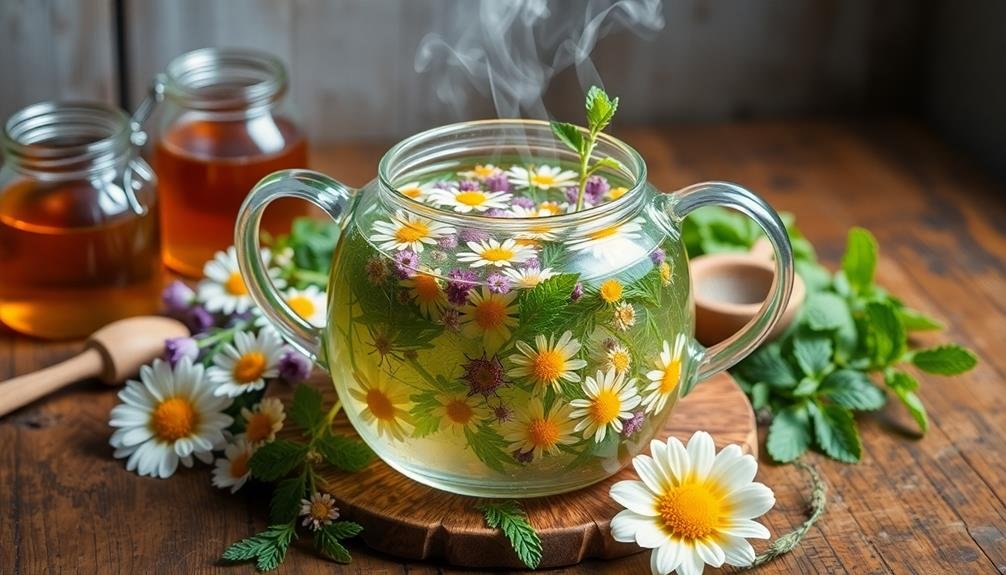
Brewing your herbal tea correctly is essential for extracting maximum potency from the herbs. To achieve this, start by using fresh, high-quality herbs whenever possible. If you're using dried herbs, crush them gently before brewing to release their essential oils.
For most herbal teas, use about 1 teaspoon of dried herbs or 1 tablespoon of fresh herbs per cup of water. Bring water to a boil, then remove it from heat and let it cool for about 30 seconds. This prevents scorching the delicate herbs.
Pour the hot water over your herbs and cover the container to trap the steam. Steep your tea for 5-10 minutes, depending on the herbs used and your desired strength. Roots and bark may require longer steeping times, up to 15 minutes. Use a fine mesh strainer to remove the herbs before drinking.
For a stronger brew, you can try the decoction method. This involves simmering tougher plant parts like roots or bark in water for 15-20 minutes. This method extracts more of the herb's medicinal properties, making it ideal for allergy relief teas.
Proper Storage of Herbal Blends
Proper storage of your herbal tea blends is essential for maintaining their potency and freshness. To guarantee your allergy-relieving herbs retain their medicinal properties, you'll need to protect them from light, heat, moisture, and air.
Store your blends in airtight containers made of dark glass or opaque materials, keeping them in a cool, dry place away from direct sunlight.
When storing your herbal tea blends, follow these guidelines:
- Label each container with the blend's name and date of preparation
- Keep different herbs separate to prevent flavor mixing and maintain individual potency
- Avoid storing herbs near strong-smelling substances, as they can absorb odors
- Check your herbs regularly for signs of mold or degradation
It's best to use your herbal tea blends within six months to a year for peak potency.
However, some herbs may have shorter shelf lives, so research the specific storage requirements for each ingredient in your blend.
Dosage and Frequency Recommendations
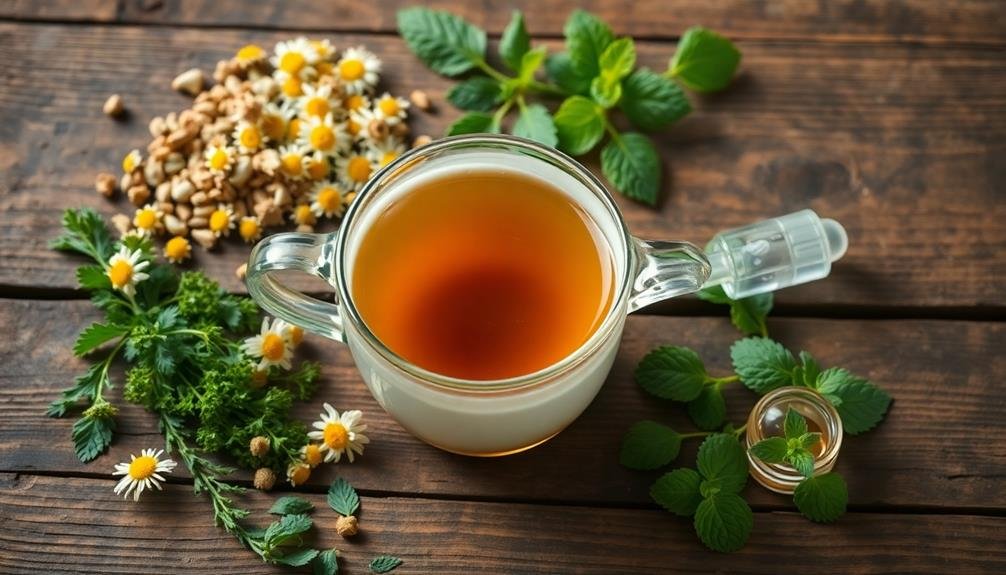
With your herbal tea blend prepared and properly stored, it's time to reflect on how much and how often you should drink it for ideal allergy relief. Start by consuming one cup of your herbal tea blend daily, preferably in the morning. This allows your body to absorb the beneficial compounds throughout the day.
If you don't notice significant improvement after a week, gradually increase to two cups daily, one in the morning and one in the evening. It's essential not to exceed three cups per day, as some herbs can have side effects when consumed in large quantities. Pay attention to your body's response and adjust accordingly.
If you experience any adverse reactions, reduce the dosage or discontinue use. For acute allergy symptoms, you can drink a cup as needed, but don't exceed the three-cup daily limit. Remember that herbal remedies often work best with consistent, long-term use.
It may take a few weeks to experience the full benefits, so be patient and consistent with your regimen. If your symptoms persist or worsen, consult a healthcare professional. They can provide personalized advice and guarantee your herbal tea doesn't interact with any medications you're taking.
Potential Side Effects
Safety should always be a top priority when using herbal remedies. While herbal teas for allergy relief are generally safe, you should be aware of potential side effects. Some herbs may interact with medications or cause allergic reactions in sensitive individuals.
It's essential to consult with a healthcare professional before incorporating new herbal remedies into your routine, especially if you're pregnant, nursing, or have pre-existing health conditions.
Be mindful of these common side effects associated with herbal teas:
- Digestive issues: Some herbs may cause nausea, stomach upset, or diarrhea.
- Drowsiness: Certain herbs have sedative properties and may cause drowsiness.
- Headaches: In rare cases, some herbs can trigger headaches or migraines.
- Skin reactions: Allergic reactions may manifest as rashes or itching.
If you experience any unusual symptoms after consuming herbal tea, discontinue use immediately and seek medical advice.
Remember that natural doesn't always mean safe for everyone. Start with small amounts to test your tolerance, and pay attention to how your body responds.
Complementary Lifestyle Changes

A holistic approach to allergy relief combines herbal teas with complementary lifestyle changes. To maximize the benefits of your DIY herbal tea, you'll want to adopt habits that support your body's natural defenses against allergens.
Start by keeping your living space clean. Vacuum regularly, use allergen-proof bedding, and invest in a high-quality air purifier to reduce indoor allergens. You should also shower before bed to wash away pollen and other irritants that accumulate on your skin and hair throughout the day.
Pay attention to your diet. Incorporate anti-inflammatory foods like leafy greens, berries, and fatty fish into your meals. These can help reduce your body's overall inflammatory response to allergens. Stay hydrated by drinking plenty of water, which helps flush out toxins and thin mucus.
Consider incorporating stress-reduction techniques into your daily routine. Practices like meditation, yoga, or deep breathing exercises can help lower stress levels, which may exacerbate allergy symptoms. Regular exercise can also boost your immune system and improve your body's ability to handle allergens.
Lastly, track your symptoms and identify triggers. This information can help you avoid specific allergens and tailor your herbal tea and lifestyle changes more effectively.
Frequently Asked Questions
Can Pregnant Women Safely Consume Herbal Teas for Allergy Relief?
You should be cautious with herbal teas during pregnancy. While some are safe, others can be harmful. It's best to consult your healthcare provider before consuming any herbal teas for allergy relief while you're expecting.
How Long Does It Take to Notice the Effects of Herbal Tea?
You'll typically notice effects within 15-30 minutes of drinking herbal tea. However, it can vary depending on the specific herbs and your body's response. Consistent daily use may lead to more noticeable results over time.
Are There Any Drug Interactions With Allergy Medications and Herbal Teas?
You should be cautious when combining herbal teas with allergy medications. Some herbs can interact with medications, affecting their efficacy or causing side effects. It's best to consult your doctor or pharmacist before mixing them.
Can Children Drink These Herbal Teas for Allergy Relief?
You should consult your child's pediatrician before giving them herbal teas for allergies. Some herbs aren't safe for children, and dosages differ. It's best to get professional advice to guarantee your child's safety and health.
Is It Possible to Develop Tolerance or Dependence on Herbal Teas?
You're unlikely to develop tolerance or dependence on herbal teas. However, it's possible to become psychologically accustomed to their effects. It's best to use them in moderation and consult a healthcare professional for long-term use.
In Summary
You've now got the tools to create your own natural allergy relief tea. Remember to choose high-quality herbs, store them properly, and enjoy your blend in moderation. While herbal teas can offer significant relief, they're not a cure-all. Pair your tea routine with other lifestyle changes for best results. If symptoms persist or worsen, don't hesitate to consult a healthcare professional. Here's to breathing easier and enjoying the seasons naturally!

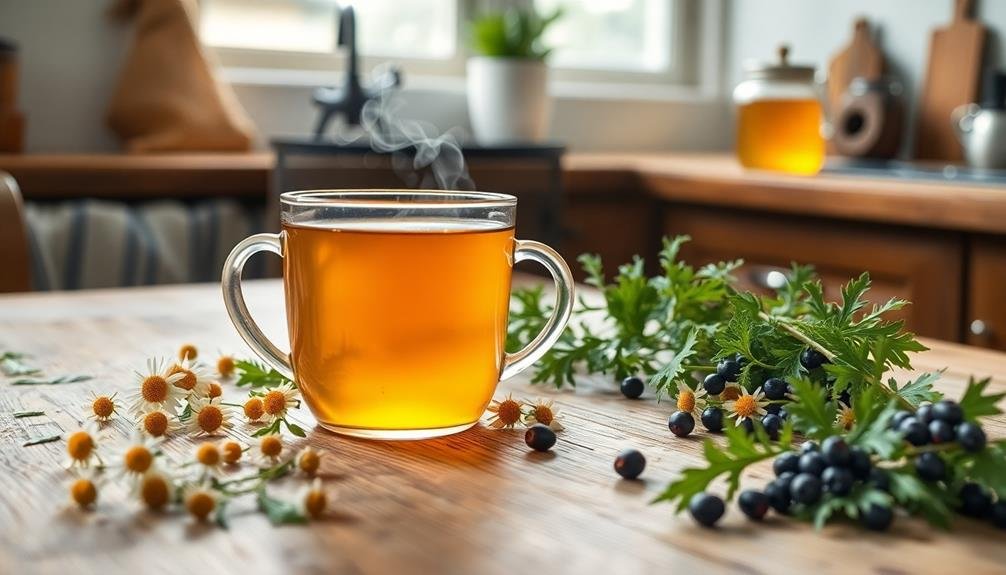



Leave a Reply